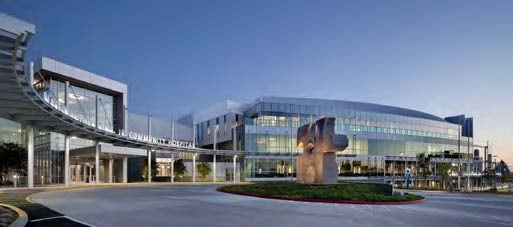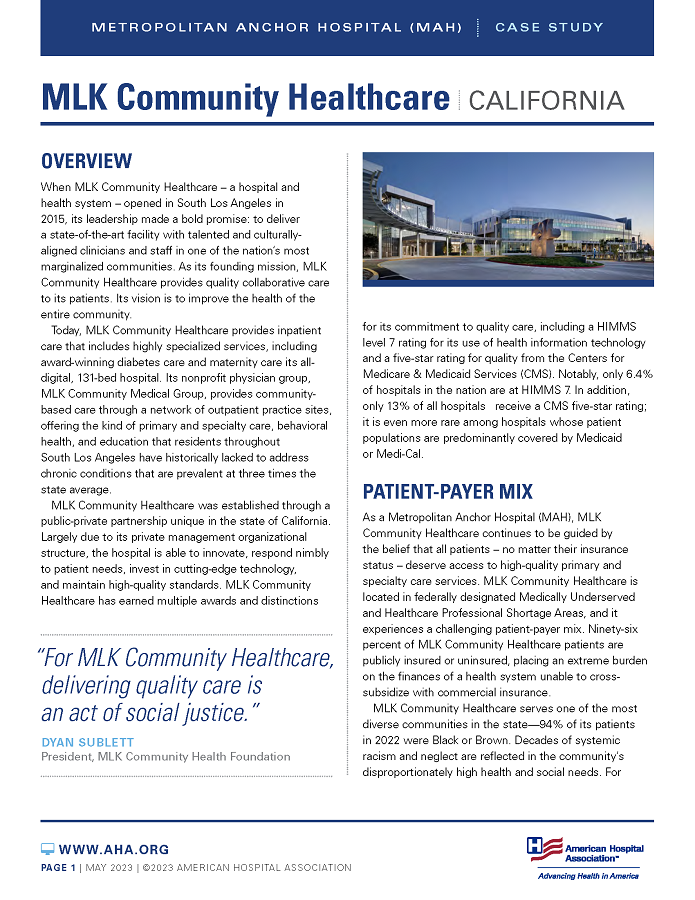

MLK Community Healthcare | California
Metropolitan Anchor Hospital (MAH) | Case Study
Overview
 When MLK Community Healthcare – a hospital and health system – opened in South Los Angeles in 2015, its leadership made a bold promise: to deliver a state-of-the-art facility with talented and culturally-aligned clinicians and staff in one of the nation’s most marginalized communities. As its founding mission, MLK Community Healthcare provides quality collaborative care to its patients. Its vision is to improve the health of the entire community.
When MLK Community Healthcare – a hospital and health system – opened in South Los Angeles in 2015, its leadership made a bold promise: to deliver a state-of-the-art facility with talented and culturally-aligned clinicians and staff in one of the nation’s most marginalized communities. As its founding mission, MLK Community Healthcare provides quality collaborative care to its patients. Its vision is to improve the health of the entire community.
Today, MLK Community Healthcare provides inpatient care that includes highly specialized services, including award-winning diabetes care and maternity care its all-digital, 131-bed hospital. Its nonprofit physician group, MLK Community Medical Group, provides community-based care through a network of outpatient practice sites, offering the kind of primary and specialty care, behavioral health, and education that residents throughout South Los Angeles have historically lacked to address chronic conditions that are prevalent at three times the state average.
"For MLK Community Healthcare, delivering quality care is an act of social justice.”
Dyan Sublett
President, MLK Community Health Foundation
MLK Community Healthcare was established through a public-private partnership unique in the state of California. Largely due to its private management organizational structure, the hospital is able to innovate, respond nimbly to patient needs, invest in cutting-edge technology, and maintain high-quality standards. MLK Community Healthcare has earned multiple awards and distinctions for its commitment to quality care, including a HIMMS level 7 rating for its use of health information technology and a five-star rating for quality from the Centers for Medicare & Medicaid Services (CMS). Notably, only 6.4% of hospitals in the nation are at HIMMS 7. In addition, only 13% of all hospitals receive a CMS five-star rating; it is even more rare among hospitals whose patient populations are predominantly covered by Medicaid or Medi-Cal.
Patient–Payer Mix
As a Metropolitan Anchor Hospital (MAH), MLK Community Healthcare continues to be guided by the belief that all patients – no matter their insurance status – deserve access to high-quality primary and specialty care services. MLK Community Healthcare is located in federally designated Medically Underserved and Healthcare Professional Shortage Areas, and it experiences a challenging patient-payer mix. Ninety-six percent of MLK Community Healthcare patients are publicly insured or uninsured, placing an extreme burden on the finances of a health system unable to crosss-ubsidize with commercial insurance.
MLK Community Healthcare serves one of the most diverse communities in the state—94% of its patients in 2022 were Black or Brown. Decades of systemic racism and neglect are reflected in the community’s disproportionately high health and social needs. For example, life expectancy in MLK Community Healthcare’s service area is ten years lower than the rest of California and the median per capita income is $16,927—less than half of the state average.
Chronic health conditions are disproportionately prevalent in the MLK Community Healthcare service area. The rate of diabetes is three times that of the rest of the state, while mortality from diabetes is 72% higher. Amputations and diabetic wound care are among the most commonly performed procedures at the hospital. In 2022, the prevalence of substance use disorder among MLK Community Healthcare patients was three times the state rate, and the number of patients with heart failure was twice as high as the statewide average. This high prevalence of chronic conditions means that MLK Community Healthcare’s patients are at an increased risk for complications, including severe symptoms from COVID-19. During the height of the pandemic, MLK Community Healthcare saw more COVID-19 patients than hospitals three to four times its size throughout Los Angeles County and was included by Becker’s Review among the 14 most highly impacted hospitals for COVID-19 in the nation.
MLK Community Healthcare's Unique Approach to Care
MLK Community Healthcare offers numerous programs to promote equal access to care and address community members’ basic and emergent health care needs:
Emergency Department
Given the lack of health care resources outside the walls of MLK Community Healthcare, community members often come to the Emergency Department to receive basic services. Even women seeking routine pregnancy-related services are cared for—and given follow-up appointments— to ensure their health and recovery. The hospital is also renowned for its triage services. Due to the use of MLK Community Healthcare’s ED for both urgent and primary care services, a department designed for 40,000 patients each year has stretched its resources to serve up to 116,000 patients annually. Yet, this has not compromised its performance. Due to process innovations, wait times are less than two hours and the Left Without Being Seen rate is the lowest among all hospitals in the area.
Investment in a Service-Oriented Health Care Workforce
Wealthy communities in Los Angeles have ten times the number of physicians located in the community than that which MLK Community Healthcare serves. To bridge this gap, MLK Community Healthcare secured over $20 million in private philanthropy to subsidize doctors’ and nurses’ salaries – helping attract a strong, service-oriented workforce, including specialists in the chronic health conditions that are disproportionately prevalent among MLK Community Healthcare’s patients.
Disease Management
For many MLK Community Healthcare patients living with multiple chronic conditions, health care services must extend beyond primary care. That’s why MLK Community Healthcare has invested in the creation of a Diabetes Center of Excellence, implementing a range of services designed to prevent avoidable ED visits and slow the progression of disease through self-management, specialized education, peer support, and a fresh produce program for food insecure patients.
Integrated Behavioral Health
An average of 10,000 patients come to the MLK Community Healthcare ED with behavioral health needs each year. With philanthropic support, MLK Community Healthcare tested an innovative pilot program integrating medical and behavioral health care in the emergency and inpatient environment with long-term follow-up treatment in the outpatient environment. The pilot program was successful and is now a signature approach for effective behavioral health care.
Metropolitan Anchor Hospitals Need Support
Since its opening, MLK Community Healthcare has provided consistent, quality care to individuals in the historically underserved communities of South Los Angeles. Serving 1.3 million residents, MLK Community Healthcare continues to be guided by the unwavering belief that all communities deserve equal access to quality care and services. Its five-star CMS rating, cutting-edge technology, culturally aligned staff and renowned medical professionals demonstrate its commitment to this principle of health equity.
The costs of treating highly complex patients without supplemental payments necessary to adequately cover their care exacerbate the heightened financial challenges MLK Community Healthcare faces from rising labor costs and inflation – threatening its ability to invest in new technologies, attract staff through competitive compensation packages, and offer much-needed preventive and specialized care services.
While MLK Community Healthcare is committed to providing a high standard of care and is taking steps to halt decades-long trends of neglect and poor health outcomes, a federal Metropolitan Anchor Hospital designation and more adequate, sustained financial support are critical to realizing this mission.


